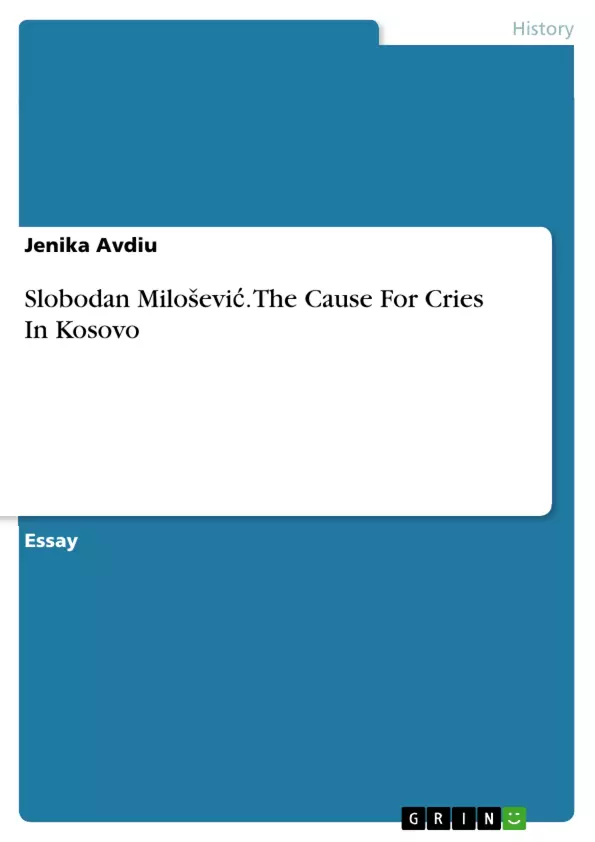Yugoslavia, founded on December 1, 1918, was composed of several republics that followed the Russian model of government. Josip Bronz Tito, president of Yugoslavia from 1943 to 1980, united several ethnic, religious, and cultural groups while keeping them together in republics. Under Tito’s governance, all people in Yugoslavia had full rights. As well as promoting a free society, Tito’s economy was flourishing. Even though they were under the Serbian Republic, Kosovo and Vojvodina received autonomous status. After Tito died in 1980, Yugoslavia began to degenerate. In 1991, Yugoslavia broke into six independent republics: Croatia, Montenegro, Serbia, Slovenia, Bosnia and Herzegovina, and Macedonia. Slobodan Milosevic was the president of Serbia from 1989 to 2000, even before Yugoslavia fell apart. Milosevic fought hard to control Kosovo by changing the constitution to keep Kosovo and Vojvodina under Serbian rule after his death. Unlike Tito, Milosevic ethnically cleansed the Albanian Kosovarains, rather than promoting the ethnic unity that was sought during the reign under Tito. One of the first actions taken by Milosevic when he gained power was to strip Kosovo of its autonomy, replacing Albanian officials with Serbian ones. Tensions increased between the two ethnic groups. Kosovo created its army, the Kosovo Liberation Army or KLA, to address issues that could not be secured through peaceful means. During the Kosovo War, which lasted from 1998 to 1999, Serbian forces drove out the vast majority of Kosovo’s ethnic Albanians, displacing hundreds of thousands of people into Albania and neighboring countries. After much bloodshed, loss, and displacement, the Kosovo War ended in 2008, with Kosovo gaining independence. [...]
Inhaltsverzeichnis (Table of Contents)
- Yugoslavia and its Republics
- Slobodan Milosevic and his Rise to Power
- The Kosovo War
- Milošević's Policies and their Consequences
- Milošević's Legacy
Zielsetzung und Themenschwerpunkte (Objectives and Key Themes)
This text explores the life and legacy of Slobodan Milošević, focusing on his rise to power, his policies in Kosovo, and the consequences of his actions. It analyzes the complex factors that contributed to the dissolution of Yugoslavia and the outbreak of the Kosovo War. The text also examines the lasting impact of Milošević's rule on Serbia and its relations with neighboring countries.
- The disintegration of Yugoslavia and the rise of Serbian nationalism
- Milošević's political strategies and his control over Kosovo
- The Kosovo War and its impact on the region
- The legacy of Milošević and the lasting effects of his policies
- The complex dynamics of ethnic relations and political power in the Balkans
Zusammenfassung der Kapitel (Chapter Summaries)
- The first chapter introduces the historical context of Yugoslavia, outlining its formation, the role of Josip Broz Tito, and the ethnic and cultural diversity of its constituent republics. It also discusses the special status granted to Kosovo and Vojvodina during Tito's rule.
- The second chapter focuses on Slobodan Milošević's rise to power, exploring his political strategies, his relationship with Serbian nationalism, and his manipulation of the Serbian constitution. The chapter examines the key factors that contributed to his success in consolidating power and his control over the League of Communists of Serbia.
- The third chapter details the Kosovo War, outlining the events leading up to the conflict, the role of the Kosovo Liberation Army (KLA), and the violence inflicted by Serbian forces. It discusses the consequences of the war, including the displacement of hundreds of thousands of Kosovar Albanians.
- The fourth chapter examines the policies implemented by Milošević during his rule, particularly his attempts to assert Serbian dominance over Kosovo and his efforts to control the Yugoslav economy. It explores the backlash against Serbia in other parts of Yugoslavia, the breakup of the Yugoslav federation, and the lasting economic and political repercussions of Milošević's actions.
Schlüsselwörter (Keywords)
The key topics and concepts explored in this text include: Yugoslavia, Slobodan Milošević, Serbian nationalism, Kosovo, Kosovo War, Kosovo Liberation Army, ethnic cleansing, political manipulation, economic reform, disintegration of Yugoslavia, Balkan politics, and international relations.
- Arbeit zitieren
- Jenika Avdiu (Autor:in), 2023, Slobodan Milošević. The Cause For Cries In Kosovo, München, GRIN Verlag, https://www.grin.com/document/1474054



